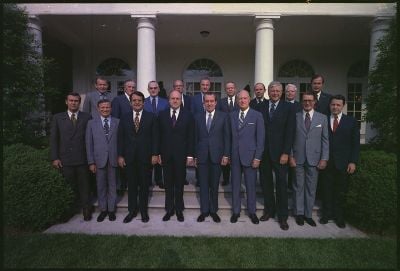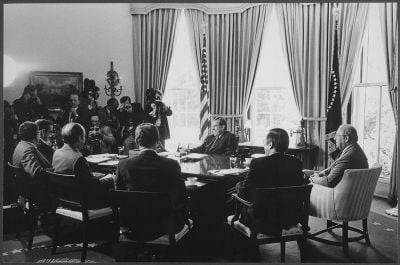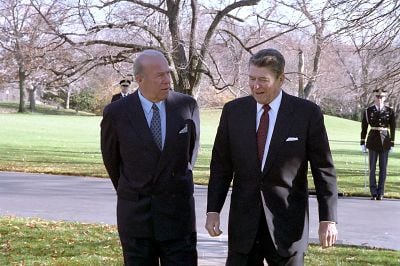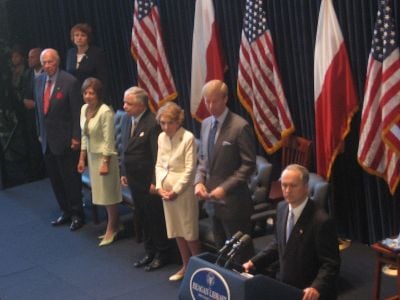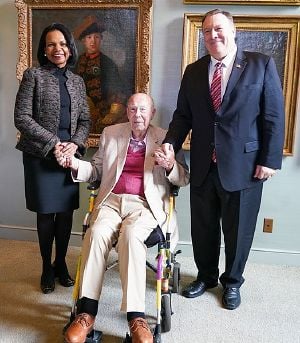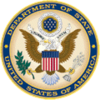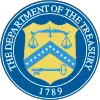| George Shultz | |
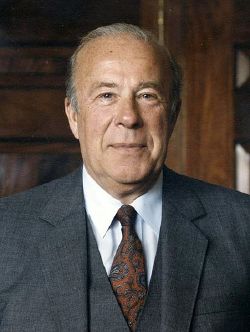 Shultz in the 1980s | |
60th United States Secretary of State
| |
| In office July 16, 1982 – January 20, 1989 | |
| Deputy | Walter J. Stoessel Jr. Kenneth W. Dam John C. Whitehead |
|---|---|
| President | Ronald Reagan |
| Preceded by | Alexander Haig |
| Succeeded by | James Baker |
62nd United States Secretary of the Treasury
| |
| In office June 12, 1972 – May 8, 1974 | |
| President | Richard Nixon |
| Preceded by | John Connally |
| Succeeded by | William E. Simon |
19th Director of the Office of Management and Budget
| |
| In office July 1, 1970 – June 11, 1972 | |
| President | Richard Nixon |
| Preceded by | Bob Mayo (Bureau of the Budget) |
| Succeeded by | Caspar Weinberger |
11th United States Secretary of Labor
| |
| In office January 22, 1969 – July 1, 1970 | |
| President | Richard Nixon |
| Preceded by | W. Willard Wirtz |
| Succeeded by | James Day Hodgson |
Personal details
| |
| Born | December 13 1920 New York City, New York, U.S. |
| Died | February 6 2021 (aged 100) Stanford, California, U.S. |
| Political party | Republican |
| Spouse | Helena O'Brien (m. 1946; died 1995) Charlotte Mailliard (m.1997) |
| Children | 5 |
| Signature | |
George Pratt Shultz (/ʃʊlts/; December 13, 1920 – February 6, 2021) was an American economist, diplomat, and businessman. He served in various positions under three different Republican presidents and is one of only two people to have held four different Cabinet-level posts, the being Elliot Richardson.
In 1970, he became the first director of the Office of Management and Budget under Richard Nixon, serving in that position until his appointment as United States Secretary of the Treasury in 1972. In that role, Shultz supported abolishing the gold standard, and presided over the end of the Bretton Woods system. From 1974 to 1982, he was an executive of the Bechtel Group, an engineering and services company. He then accepted President Ronald Reagan's offer to serve as United States Secretary of State, holding that office from 1982 to 1989, playing a major role in shaping the foreign policy of the Ronald Reagan administration. Shultz pushed for Reagan to establish relations with Soviet leader Mikhail Gorbachev, which led to a thaw between the United States and the Soviet Union.
After retiring from public office Shultz remained active, notably promoting nuclear arms control calling on governments to embrace the vision of a world free of nuclear weapons as well as advocating efforts to fight anthropogenic climate change. Shultz' life of public service was not just for the sake of his country but he sought to create a world of freedom for all people.
Life
Shultz was born December 13, 1920, in New York City, the only child of Margaret Lennox (née Pratt) and Birl Earl Shultz. He grew up in Englewood, New Jersey.[1] His great-grandfather was an immigrant from Germany who arrived in the United States in the middle of the nineteenth century. Contrary to common assumption, Shultz was not a member of the Pratt family associated with John D. Rockefeller and the Standard Oil Trust.[2]
After attending the local public school, he transferred to the Englewood School for Boys (now Dwight-Englewood School), through his second year of high school.[3] In 1938, Shultz graduated from the private preparatory boarding high school Loomis Chaffee School in Windsor, Connecticut.
He earned a bachelor's degree, cum laude, at Princeton University in economics with a minor in public and international affairs. His senior thesis, "The Agricultural Program of the Tennessee Valley Authority", examined the Tennessee Valley Authority's effect on local agriculture, for which he conducted on-site research.[4] He graduated with honors in 1942.[1]
From 1942 to 1945, Shultz was on active duty in the U.S. Marine Corps. He was an artillery officer, attaining the rank of captain. He was attached to the U.S. Army 81st Infantry Division during the Battle of Angaur (Battle of Peleliu).
While on a rest and recreation break in Hawaii from serving in the Marines in the Asiatic-Pacific Theater during World War II, Shultz met military nurse lieutenant Helena Maria O'Brien (1915–1995). They married on February 16, 1946, and had five children: Margaret Ann Tilsworth, Kathleen Pratt Shultz Jorgensen, Peter Milton Shultz, Barbara Lennox Shultz White, and Alexander George Shultz.[1] O'Brien died of pancreatic cancer in 1995.[5]
In 1949, Shultz earned a Ph.D. in industrial economics from the Massachusetts Institute of Technology. From 1948 to 1957, he taught in the MIT Department of Economics and the MIT Sloan School of Management, with a leave of absence in 1955 to serve on President Dwight D. Eisenhower's Council of Economic Advisers as a Senior Staff Economist. In 1957, Shultz left MIT and joined the University of Chicago Graduate School of Business as a professor of industrial relations, and he served as the Graduate School of Business Dean from 1962 to 1968.[6] During his time in Chicago, he was influenced by Nobel Laureates Milton Friedman and George Stigler, who reinforced Shultz's view of the importance of a free-market economy.[7] He left the University of Chicago to serve under President Richard Nixon in 1969.
In 1997, Shultz married Charlotte Mailliard Swig, a prominent San Francisco philanthropist and socialite.[8] They remained married until his death.
Shultz died at age 100 at his home in Stanford, California, on February 6, 2021.[9] He was buried next to his first wife at Dawes Cemetery in Cummington, Massachusetts.[10]
Nixon Administration
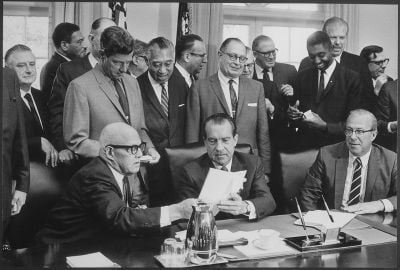
Secretary of Labor
Shultz was President Richard Nixon's Secretary of Labor from 1969 to 1970. Daniel Patrick Moynihan, Nixon's first choice for Secretary of Labor, was deemed unacceptable by AFL–CIO President George Meany, which pushed to fill the position with Shultz, then Dean of University of Chicago's School of Business]], (with prior experience in another GOP administration, on President Eisenhower's Council of Economic Advisers).[11]
Shultz soon faced the crisis of the Longshoremen's Union strike. The Lyndon B. Johnson Administration had delayed the walkout with a Taft Hartley injunction that expired, and the press pressed him to describe his approach. He applied the theory he had developed in academia: he let the parties work it out, which they did quickly. He also imposed the Philadelphia Plan, which required Pennsylvania construction unions to admit a certain number of black members by an enforced deadline - a break with their past policy of largely discriminating against such members. This marked the first use of racial quotas in the federal government.[12]
Office of Management and Budget
Shultz became the first director of the Office of Management and Budget, the renamed and reorganized Bureau of the Budget, on July 1, 1970.[13] He was the agency's 19th director.[14]
Secretary of the Treasury
Shultz was United States Secretary of the Treasury from June 1972 to May 1974. During his tenure, he was concerned with two major issues, namely the continuing domestic administration of Nixon's "New Economic Policy," begun under Secretary John Connally (Shultz privately opposed its three elements), and a renewed dollar crisis that broke out in February 1973.[2]
Domestically Shultz enacted the next phase of the NEP, lifting price controls begun in 1971. This phase was a failure, resulting in high inflation, and price freezes were reestablished five months later.[15]
Meanwhile, Shultz's attention was increasingly diverted from the domestic economy to the international arena. In 1973, he participated in an international monetary conference in Paris that grew out of the 1971 decision to abolish the gold standard, a decision Shultz and Paul Volcker had supported. The conference formally abolished the Bretton Woods system, causing all currencies to float. During this period Shultz co-founded the "Library Group," which became the G7. Shultz resigned shortly before Nixon to return to private life.[15]
Business executive
In 1974, Shultz left government service to become executive vice president of Bechtel Group, a large engineering and services company. He was later its president and a director.[16]
Under Shultz's leadership, Bechtel received contracts for many large construction projects, including from Saudi Arabia. In the year before he left Bechtel, the company reported a 50 percent increase in revenue.[17]
Reagan Administration - Secretary of State
On July 16, 1982, Shultz was appointed by President Ronald Reagan as the 60th U.S. Secretary of State, replacing Alexander Haig, who had resigned. Shultz served for six and a half years, the longest tenure since Dean Rusk.[18] The possibility of a conflict of interest in his position as Secretary of State after being in the upper management of the Bechtel Group was raised by several senators during his confirmation hearings. Shultz briefly lost his temper in response to some questions on the subject, stating “I resent what I regard as a kind of smear on Bechtel.” He was nevertheless unanimously confirmed by the Senate.[19]
Shultz relied primarily on the Foreign Service to formulate and implement Reagan's foreign policy. As reported in the State Department's official history:
By the summer of 1985, Shultz had personally selected most of the senior officials in the Department, emphasizing professional over political credentials in the process [...] The Foreign Service responded in kind by giving Shultz its 'complete support,' making him one of the most popular Secretaries since Dean Acheson.[18]
Shultz's success came from not only the respect he earned from the bureaucracy but the strong relationship he forged with Reagan, who trusted him completely.[20]
Relations with China
Shultz inherited negotiations with the People's Republic of China over Taiwan from his predecessor. Under the terms of the Taiwan Relations Act, the United States was obligated to assist in Taiwan's defense, which included the sale of arms. The Administration debate on Taiwan, especially over the sale of military aircraft, resulted in a crisis in relations with China, which was alleviated only in August 1982, when, after months of arduous negotiations, the United States and the PRC issued a joint communiqué on Taiwan in which the United States agreed to limit arms sales to the island nation and China agreed to seek a "peaceful solution."[21]
Relations with Europe and the Soviet Union
By the summer of 1982, relations were strained not only between Washington and Moscow but also between Washington and key capitals in Western Europe. In response to the imposition of martial law in Poland the previous December, the Reagan administration had imposed sanctions on a pipeline between West Germany and the Soviet Union. European leaders vigorously protested sanctions that damaged their interests but not U.S. interests in grain sales to the Soviet Union. Shultz resolved this "poisonous problem" in December 1982, when the United States agreed to abandon sanctions against the pipeline and the Europeans agreed to adopt stricter controls on strategic trade with the Soviets.[22]
A more controversial issue was the NATO Ministers' 1979 "dual track" decision: if the Soviets refused to remove their SS-20 medium range ballistic missiles within four years, then the Allies would deploy a countervailing force of cruise and Pershing II missiles in Western Europe. When negotiations on these intermediate nuclear forces (INF) stalled, 1983 became a year of protest. Shultz and other Western leaders worked hard to maintain allied unity amidst anti-nuclear demonstrations in Europe and the United States. In spite of Western protests and Soviet propaganda, the allies began deployment of the missiles as scheduled in November 1983.[22]
U.S.–Soviet tensions were raised by the announcement in March 1983 of the Strategic Defense Initiative, and exacerbated by the Soviet shoot-down of Korean Air Lines Flight 007 near Moneron Island on September 1. Tensions reached a high with the Able Archer 83 exercises in November 1983, during which the Soviets feared a pre-emptive American attack.[23]
Following the missile deployment and the exercises, both Shultz and Reagan resolved to seek further dialogue with the Soviets.[24]
When President Mikhail Gorbachev of Russia came to power in 1985, Shultz advocated that Reagan pursue a personal dialogue with him. Reagan gradually changed his perception of Gorbachev's strategic intentions in 1987, when the two leaders signed the Intermediate Range Nuclear Forces Treaty.[25] The treaty, which eliminated an entire class of missiles in Europe, was a milestone in the history of the Cold War. Although Gorbachev took the initiative, Reagan was well prepared by the State Department to negotiate.[26]
Shultz was instrumental in gaining freedom for Soviet Jewry, making freedom for Soviet Jews a key issue in his talks with Russian leaders. For example, he campaigned directly for the release of Natan Sharansky, with the strong support of President Ronald Reagan. [27]
Two more events in 1988 persuaded Shultz that Soviet intentions were changing. First, the Soviet Union's initial withdrawal from Afghanistan indicated that the Brezhnev Doctrine was dead. "If the Soviets left Afghanistan, the Brezhnev Doctrine would be breached, and the principle of 'never letting go' would be violated," Shultz reasoned.[25] The second event happened during the 19th Communist Party Conference, "at which Gorbachev proposed major domestic reforms such as the establishment of competitive elections with secret ballots; term limits for elected officials; separation of powers with an independent judiciary; and provisions for freedom of speech, assembly, conscience, and the press."[25] The proposals indicated that Gorbachev was making revolutionary and irreversible changes.
Middle East diplomacy
In response to the escalating violence of the Lebanese civil war, Reagan sent a Marine contingent to protect the Palestinian refugee camps and support the Lebanese Government. The October 1983 bombing of the Marine barracks in Beirut killed 241 U.S. servicemen, after which the deployment came to an ignominious end.[18] Shultz subsequently negotiated an agreement between Israel and Lebanon and convinced Israel to begin partial withdrawal of its troops in January 1985 despite Lebanon's contravention of the settlement.[28]
During the First Intifada, Shultz "proposed ... an international convention in April 1988 ... on an interim autonomy agreement for the West Bank and Gaza Strip, to be implemented as of October for a three-year period."[29] By December 1988, after six months of shuttle diplomacy, Shultz had established a diplomatic dialogue with the Palestine Liberation Organization, which was picked up by the next Administration.[18]
Latin America
Shultz was known for outspoken opposition to the "arms for hostages" scandal that would eventually become known as the Iran-Contra Affair.[30] In 1983 testimony before Congress, he said that the Sandinista government in Nicaragua was "a very undesirable cancer in the area."[31] He was also opposed to any negotiation with the government of Daniel Ortega: "Negotiations are a euphemism for capitulation if the shadow of power is not cast across the bargaining table."[32]
Later life
Shultz retired from public office in 1989 but remained active in business and politics; he "retained an iconoclastic streak" and publicly opposed some positions taken by fellow Republicans. For example, he called the War on Drugs a failure,[33] and added his signature to an advertisement printed in The New York Times in 1998, headlined "We believe the global war on drugs is now causing more harm than drug abuse itself." In 2011, he was part of the Global Commission on Drug Policy, which called for a public health and harm reduction approach towards drug abuse, alongside Kofi Annan, Paul Volcker, and George Papandreou.[34]
Shultz was an early advocate of the presidential candidacy of George W. Bush, whose father, George H. W. Bush, was Reagan's vice president. In April 1998, Shultz hosted a meeting at which George W. Bush discussed his views with policy experts including Michael Boskin, John Taylor, and Condoleezza Rice, who were evaluating possible Republican candidates to run for president in 2000. At the end of the meeting, the group felt they could support Bush's candidacy, and Shultz encouraged him to enter the race.
He then served as an informal advisor for Bush's presidential campaign during the 2000 election.[33] Shultz has been called the father of the "Bush Doctrine" and generally defended the Bush administration's foreign policy.[35] Shultz supported the 2003 invasion of Iraq, writing in support of U.S. military action months before the war began.[36]
Shultz continued to be a strong advocate for nuclear arms control, saying in a 2008 interview: "Now that we know so much about these weapons and their power, they're almost weapons that we wouldn't use, so I think we would be better off without them."[33] In January 2008, Shultz co-authored (with William Perry, Henry Kissinger, and Sam Nunn) an op-ed in The Wall Street Journal that called on governments to embrace the vision of a world free of nuclear weapons.[37] The four created the Nuclear Threat Initiative to advance this agenda, focused on both preventing nuclear terrorist attacks and a nuclear war between world powers. In 2010, the four were featured in the documentary film Nuclear Tipping Point, which discussed their agenda.[38]
Shultz was a prominent advocate of efforts to fight anthropogenic climate change.[33] He favored a revenue-neutral carbon tax (that is, a carbon fee and dividend program, in which carbon dioxide emissions are taxed and the net funds received are rebated to taxpayers) as the most economically efficient means of mitigating climate change.[39] In April 2013, he co-wrote, with economist Gary Becker, an op-ed in the Wall Street Journal that concluded that this plan would "benefit all Americans by eliminating the need for costly energy subsidies while promoting a level playing field for energy producers."[40] He repeated this call in a September 2014 talk at MIT.[41] In 2014, Shultz joined the advisory board of the Citizens' Climate Lobby, and in 2017, Shultz co-founded the Climate Leadership Council, along with George H. W. Bush's Secretary of State James Baker and George W. Bush's Secretary of the Treasury Henry Paulson. The group advocated for taxing carbon pollution produced by burning fossil fuels as "a conservative climate solution" based on free-market principles.[42] In 2017, these Republican elder statesmen, along with Martin S. Feldstein and N. Gregory Mankiw, urged conservatives to embrace a carbon fee and dividend program.[43]
Theranos scandal
From 2011 to 2015, Shultz was a member of the board of directors of Theranos, a health technology company that became known for its false claims to have devised revolutionary blood tests.[44] He was a prominent figure in the ensuing scandal.
After joining the company's board in November 2011, Shultz recruited other political figures, including former Secretary of State Henry Kissinger, former Secretary of Defense William Perry, and former U.S. Senator Sam Nunn. Shultz also promoted Theranos founder Elizabeth Holmes at major forums, including Stanford University's Institute for Economic Policy Research (SIEPR), and was on record supporting her in major media publications.
Shultz's grandson, Tyler Shultz, joined Theranos in September 2013 after graduating from Stanford University with a degree in biology. Tyler was forced to leave the company in 2014 after raising concerns about its testing practices with Holmes and his grandfather. George Shultz initially did not believe Tyler's warnings and pressured him to keep quiet.[45] Tyler eventually contacted reporter John Carreyrou (who went on to expose the scandal in The Wall Street Journal), but as summarized by ABC Nightline, "it wasn’t long before Theranos got wind of it and attempted to use George Shultz to silence his grandson."[46] Despite pressure, Tyler refused to back down. Theranos was shut down on September 4, 2018.[47] In a 2019 media statement, Shultz praised his grandson for not having shrunk "from what he saw as his responsibility to the truth and patient safety, even when he felt personally threatened and believed that I had placed allegiance to the company over allegiance to higher values and our family. ... Tyler navigated a very complex situation in ways that made me proud."[46]
Memberships
Shultz had a long affiliation at the Hoover Institution at Stanford University, where he was a distinguished fellow and, beginning in 2011, the Thomas W. and Susan B. Ford Distinguished Fellow; from 2018 until his death, Shultz hosted events on governance at the institution.[48] Shultz was chairman of JPMorgan Chase's international advisory council.[36] He was co-chairman of the conservative Committee on the Present Danger.[36]
He was an honorary director of the Institute for International Economics. He was a member of the Washington Institute for Near East Policy (WINEP) board of advisors, the New Atlantic Initiative, the Mandalay Camp at the Bohemian Grove, and the Committee for the Liberation of Iraq. He served as an advisory board member for the Partnership for a Secure America and Citizens' Climate Lobby.[49] He was honorary chairman of the Israel Democracy Institute, and a member of the advisory board of Spirit of America, a 501(c)(3) organization.
Together again with former Secretary of Defense William Perry, Shultz was serving on the board of Acuitus at the time of his death.[50]
Legacy
Shultz is one of only two individuals to have served in four United States Cabinet positions within the United States government. Diplomatic historian Walter LaFeber stated that Shultz' 1993 memoir, Turmoil and Triumph: My Years as Secretary of State, "is the most detailed, vivid, outspoken, and reliable record we probably shall have of the 1980s until the documents are opened."[51]
President Joe Biden reacted to Shultz's death by saying:
He was a gentleman of honor and ideas, dedicated to public service and respectful debate, even into his 100th year on Earth. That’s why multiple presidents, of both political parties, sought his counsel. I regret that, as president, I will not be able to benefit from his wisdom, as have so many of my predecessors.[52]
Others responded with praise and gratitude for his service which benefited not only the United States but the whole world:[53]
America has lost one of its finest statesmen with the passing of George Shultz. He was a person of deep intellect, talent, and patriotism. He took on a wide range of important jobs and did them all well. George Shultz was a great public servant, and America is better because of that service (George W. Bush).
George Shultz was a great man who both witnessed and made history in the course of a remarkable 100 years. We have lost a champion of diplomacy, an advocate of American leadership, and a model of public service (Madeleine Albright).
As Secretary of State for six and a half of President Reagan’s eight years, Secretary Shultz personally shaped world history for the better. He kept U.S.-Soviet relations peaceful but purposeful as the free world defeated communism (Mitch McConnell).
Honors and Awards
Shultz received numerous awards during his long years of service.
Honorary degrees were conferred on Shultz from the universities of Columbia, Notre Dame, Loyola, Pennsylvania, Rochester, Princeton, Carnegie Mellon, City University of New York, Yeshiva, Northwestern, Technion, Tel Aviv, Weizmann Institute of Science, Baruch College of New York, Williams College, Hebrew University of Jerusalem, Tbilisi State University in the Republic of Georgia, and Keio University in Tokyo.[54]
Following are a selection of awards he received:
- 2016 –San Francisco State University's President's Medal [55]
- 2012 – Henry A. Kissinger Prize of the American Academy in Berlin[56]
- 2010 – California Hall of Fame[57]
- 2007 – Truman Medal for Economic Policy[54]
- 2008 – Rumford Prize[58]
- 2007 – Emma Lazarus Statue of Liberty Award[59]
- 2006 – National World War II Museum, American Spirit Award[54]
- 2005 – Lead21, Lifetime Achievement Award[60]
- 2004 – American Economic Association, Distinguished Fellow[61]
- 2003 – Lifetime Contributions to American Diplomacy Award, American Foreign Service Association[62]
- 2002 – Reagan Distinguished American Award[54]
- 2002 – Ralph Bunche Award[63]
- 2001 – Eisenhower Medal for Leadership[54]
- 2000 – Woodrow Wilson Award for Public Service
- 1996 – Koret Prize[54]
- 1992 – Seoul Peace Prize (Korea)[54]
- 1989 – Presidential Medal of Freedom[54]
- 1989 – Order of the Rising Sun with Paulownia Flowers, Grand Cordon (Japan)[63]
- 1986 – Freedoms Foundation, George Washington Medal[54]
Selected works
- Shultz, George P., and James F. Goodby. The War that Must Never be Fought. Hoover Press, 2015. ISBN 978-0817918453
- Shultz, George P. Issues on My Mind: Strategies for the Future. Hoover Institution Press, 2013. ISBN 9780817916244
- Shultz, George P., and John B. Shoven. Putting Our House in Order: A Guide to Social Security and Health Care Reform. New York: W.W. Norton, 2008. ISBN 9780393069617
- Shultz, George P. Economics in Action: Ideas, Institutions, Policies, Hoover Institution on War, Revolution and Peace. Stanford University Press, 1995. ISBN 9780817956332
- Shultz, George P. Turmoil and Triumph: My Years as Secretary of State. New York: Scribner's, 1993. ISBN 9781451623116
- Shultz, George P. Risk, Uncertainty, and Foreign Economic Policy. D. Davies Memorial Institute of International Studies, 1981.
- Shultz, George P., and Kenneth W. Dam. Economic Policy beyond the Headlines. W.W. Norton, 1978. ISBN 978-0226755991
- Shultz, George P. Leaders and Followers in an Age of Ambiguity. New York University Press, 1975. ISBN 0814777651
- Shultz, George P., and Albert Rees. Workers and Wages in an Urban Labor Market. University of Chicago Press, 1970. ISBN 0226707059
- Shultz, George P., and Arnold R. Weber. Strategies for the Displaced Worker: Confronting Economic Change. Harper, 1966. ISBN 9780837188553
- Shultz, George P., and George Benedict Baldwin. Automation, a new dimension to old problems. Washington: Public Affairs Press 1955).
- Shultz, George P., and John R. Coleman. Labor Problems: Cases and Readings. McGraw-Hill, 1953.
- Shultz, George P. Pressures on Wage Decisions: A Case Study in the Shoe Industry. John Wiley & Sons, 1951.
- Shultz, George P., and Charles Andrew Myers. The Dynamics of a Labor Market: A Study of the Impact of Employment Changes on Labor Mobility, Job Satisfaction, and Company and Union Policies. Prentice-Hall, 1951.
Notes
- ↑ 1.0 1.1 1.2 Bernard S. Katz and C. Daniel Vencill, Biographical Dictionary of the United States Secretaries of the Treasury, 1789–1995 (Greenwood Publishing Group, 1996, ISBN 978-0313280122), 320–332.
- ↑ 2.0 2.1 Robert Vellani, "George P. Shultz" in William L. O'Neill (ed.) The Scribner Encyclopedia of American Lives, Thematic Series: The 1960's (Charles Scribner & Sons, 2002, ISBN 978-0684806662).
- ↑ Paul Burnett, Problems and Principles: George P. Shultz and the Uses of Economic Thinking Economist Life Stories, November 20, 2016. Retrieved April 13, 2022.
- ↑ George Pratt Shultz, The Agricultural Program of the Tennessee Valley Authority Princeton University Library. Retrieved April 13, 2022.
- ↑ Helena Maria Shultz; Former Nurse, Wife of Ex-Diplomat Los Angeles Times, September 9, 1995. Retrieved April 13, 2022.
- ↑ Ronald Reagan: Nomination of George P. Shultz To Be Secretary of State The American Presidency Project, June 25, 1982. Retrieved April 13, 2022.
- ↑ The Chicago School and Its Impact Commanding Heights: George Shultz, October 2, 2000. Retrieved April 13, 2022.
- ↑ Trish Donnally, Swig Tames Her Tiger SFGate, August 16, 1997. Retrieved April 13, 2022.
- ↑ Matthew S. Schwartz, George P. Shultz, Giant Of 20th Century American Politics, Dies At 100 NPR, February 7, 2021.
- ↑ George Pratt Shultz (1920-2021) Find a Grave. Retrieved April 13, 2022.
- ↑ John Gizzi, Remembering George Shultz: Washington Insider and Infighter NewsMax, February 7, 2021.
- ↑ David Frum, How We Got Here: The '70s (New York: Basic Books, 2000, ISBN 978-0465041954).
- ↑ Richard J. Ellis, The Development of the American Presidency (Routledge, 2022, ISBN 978-1032070018).
- ↑ Former Directors of OMB and BOB Office of Management and Budget. Retrieved April 13, 2022.
- ↑ 15.0 15.1 George P. Shultz (1972 - 1974) United States Department of the Treasury. Retrieved April 13, 2022.
- ↑ Bechtel, Business and the Board of Directors Free To Choose Network. Retrieved April 14, 2022.
- ↑ Thomas J. Lueck, Bechtel Loses Another Officer to Reagan's Cabinet The New York Times, June 26, 1982. Retrieved April 14, 2022.
- ↑ 18.0 18.1 18.2 18.3 Secretary Shultz Takes Charge A Short History of the Department of State, United States Department of State, Office of the Historian. Retrieved April 14, 2022.
- ↑ William Greider, The Boys From Bechtel Rolling Stone, September 2, 1982. Retrieved April 14, 2022.
- ↑ Ruud van Dijk, William Glenn Gray, Svetlana Savranskaya, Jeremi Suri, and Qiang Zhaivan (eds.), Encyclopedia of the Cold War Vol. 1, (New York: Routledge, 2008, ISBN 978-0415975155), 787.
- ↑ Reagan's Foreign Policy A Short History of the Department of State, United States Department of State, Office of the Historian. Retrieved April 14, 2022.
- ↑ 22.0 22.1 The United States in Europe A Short History of the Department of State, United States Department of State, Office of the Historian. Retrieved April 14, 2022.
- ↑ Christopher Andrew and Oleg Gordievsky, KGB: The Inside Story of Its Foreign Operations from Lenin to Gorbachev (Harpercollins, 1990, ISBN 978-0060166052).
- ↑ Ronald Reagan, An American Life (New York: Simon and Schuster, 1990, ISBN 978-0671691981).
- ↑ 25.0 25.1 25.2 Keren Yarhi-Milo, In the Eye of the Beholder: How Leaders and Intelligence Communities Assess the Intentions of Adversaries International Security 38(1) (Summer 2013): 31. Retrieved April 14, 2022.
- ↑ Gorbachev and Perestroika A Short History of the Department of State, United States Department of State, Office of the Historian. Retrieved April 14, 2022.
- ↑ George Shultz Cleveland Jewish News, April 23, 2018. Retrieved April 13, 2022.
- ↑ Biographies of the Secretaries of State: George Pratt Shultz (1920–2021) United States Department of State, Office of the Historian. Retrieved April 14, 2022.
- ↑ Avraham Sela (ed.), The Continuum Political Encyclopedia of the Middle East (New York: Continuum, 2002, ISBN 978-0826414137).
- ↑ George Shultz Secretary of State Understanding the Iran-Contra Affairs - The Legal Aftermath. Retrieved April 14, 2022.
- ↑ Lawrence L Knutson, Shultz Says U.S. Has Moral Duty To Support Contras AP NEWS, March 4, 1986. Retrieved April 14, 2022.
- ↑ John Hanna, Preceed Washington AP NEWS, April 14, 1986. Retrieved April 14, 2022.
- ↑ 33.0 33.1 33.2 33.3 Matthew Lee, Longtime Reagan Secretary of State George Shultz dies at 100 Associated Press, February 7, 2021. Retrieved April 15, 2022.
- ↑ Commissioners Global Commission on Drug Policy. Retrieved April 14, 2022.
- ↑ Daniel Henninger, Father of the Bush Doctrine The Wall Street Journal, April 29, 2006. Retrieved April 15, 2022.
- ↑ 36.0 36.1 36.2 Laurence Arnold, George Shultz, Who Led Reagan's Cold-War Diplomacy, Dies Bloomberg News, February 7, 2021. Retrieved April 15, 2022.
- ↑ George Schultz, William J. Perry, Henry Kissinger, and Sam Nunn, Toward a Nuclear-Free World The Wall Street Journal, January 15, 2008. Retrieved April 15, 2022.
- ↑ Nuclear Tipping Point Documentary 'Nuclear Threat Initiative. Retrieved April 15, 2022.
- ↑ George Shultz, A Reagan approach to climate change The Washington Post, March 13, 2015. Retrieved April 15, 2022.
- ↑ Why We Support a Revenue-Neutral Carbon Tax The Wall Street Journal, April 7, 2013. Retrieved April 15, 2022.
- ↑ Peter Dizikes, George Shultz: “Climate is changing,” and we need more action MIT News, October 1, 2014. Retrieved April 15, 2022.
- ↑ John Schwartz, 'A Conservative Climate Solution': Republican Group Calls for Carbon Tax The New York Times, February 7, 2017. Retrieved April 15, 2022.
- ↑ The Conservative Case for Carbon Dividends Climate Leadership Council, February 2017. Retrieved April 15, 2022.
- ↑ John Carreyrou, Bad Blood: Secrets and Lies in a Silicon Valley Startup (Knopf, 2018, ISBN 978-1524731656).
- ↑ John Carreyrou, Theranos Whistleblower Shook the Company—and His Family The Wall Street Journal, November 18, 2016. Retrieved April 15, 2022.
- ↑ 46.0 46.1 Taylor Dunn, Victoria Thompson, Rebecca Jarvis, and Ashley Louszko, Ex-Theranos CEO Elizabeth Holmes says 'I don't know' 600-plus times in never-before-broadcast deposition tapes ABC News, January 23, 2019. April 15, 2022.
- ↑ John Carreyou, Blood-Testing Firm Theranos to Dissolve The Wall Street Journal, September 5, 2018. Retrieved April 15, 2022.
- ↑ Distinguished American Statesman, 60th US Secretary of State George P. Shultz, Dies at 100 Hoover Institution, February 7, 2021. Retrieved April 15, 2022.
- ↑ Advisory Board Citizens' Climate Lobby. Retrieved April 15, 2022.
- ↑ Our Leadership Team Acuitus. Retrieved April 15, 2022.
- ↑ Walter LaFeber, Reviewed Work: Turmoil and Triumph: My Years as Secretary of State by George P. Shultz American Historical Review 98(4) (October, 1993): 1203.
- ↑ Statement of President Joe Biden on the Passing of Former Secretary George Shultz The White House, February 7, 2021. Retrieved April 15, 2022.
- ↑ Reaction to death of former U.S. Secretary of State George Shultz Reuters, February 7, 2021. Retrieved April 15, 2022.
- ↑ 54.0 54.1 54.2 54.3 54.4 54.5 54.6 54.7 54.8 George P. Shultz Hoover Foundation. Retrieved April 15, 2022.
- ↑ Renowned U.S. statesman George Shultz to receive SF State's President's Medal SF State News.
- ↑ The Henry A. Kissinger Prize 2012 The American Academy in Berlin. Retrieved April 16, 2022.
- ↑ California Hall of Fame Inducts George P. Shultz Hoover Institution, December 14, 2010. Retrieved April 16, 2022.
- ↑ Nuclear Arms Control Leaders Receive Prestigious Rumford Prize from the American Academy American Academy of Arts and Sciences, October 9, 2008. Retrieved April 16, 2022.
- ↑ Emma Lazarus Statue of Liberty Award American Jewish Historical Society. Retrieved April 16, 2022.
- ↑ The 2006 Lead21 Annual Awards Ceremony Asians and Americans for Action. Retrieved April 16, 2022.
- ↑ Distinguished Fellows American Economic Association. Retrieved April 16, 2022.
- ↑ Secretary Powell to Present American Foreign Service Association Award to George P. Shultz - June 26 US Department Of State Archive, June 25, 2003. Retrieved April 16, 2022.
- ↑ 63.0 63.1 Elizabeth Sleeman (ed.), The International Who's Who 2004 (Routledge, 2003, ISBN 978-1857432176), 1547.
ReferencesISBN links support NWE through referral fees
- Andrew, Christopher, and Oleg Gordievsky. KGB: The Inside Story of Its Foreign Operations from Lenin to Gorbachev. Harpercollins, 1990. ISBN 978-0060166052
- Carreyrou, John. Bad Blood: Secrets and Lies in a Silicon Valley Startup. Knopf, 2018. ISBN 978-1524731656
- van Dijk, Ruud, William Glenn Gray, Svetlana Savranskaya, Jeremi Suri, and Qiang Zhaivan (eds.). Encyclopedia of the Cold War Vol. 1. New York: Routledge, 2008. ISBN 978-0415975155
- Frum, David. How We Got Here: The '70s. New York: Basic Books, 2000. ISBN 978-0465041954
- Katz, Bernard S., and C. Daniel Vencill. Biographical Dictionary of the United States Secretaries of the Treasury, 1789–1995. Greenwood Publishing Group, 1996. ISBN 978-0313280122
- O'Neill, William L. (ed.). The Scribner Encyclopedia of American Lives, Thematic Series: The 1960's. Charles Scribner & Sons, 2002. ISBN 978-0684806662
- Reagan, Ronald. An American Life. New York: Simon and Schuster, 1990. ISBN 978-0671691981
- Sela, Avraham (ed.). The Continuum Political Encyclopedia of the Middle East. New York: Continuum, 2002. ISBN 978-0826414137
- Sleeman, Elizabeth (ed.). The International Who's Who 2004. Routledge, 2003. ISBN 978-1857432176
External links
All links retrieved May 21, 2024.
- Turmoil & Triumph: The George Shultz Years Free To Choose Network
- Secretary George P. Shultz Association for the Study of the Middle East and Africa (ASMEA)
- George P. Shultz Hoover Institution
- Biographies of the Secretaries of State: George Pratt Shultz (1920–2021) Office of the Historian
- George Shultz, statesman and Stanford scholar, dies at 100 Stanford News, February 7, 2021.
| Academic offices | ||
|---|---|---|
| Preceded by: W. Allen Wallis |
Dean of the Booth School of Business 1962–1969 |
Succeeded by: Sidney Davidson |
| Political offices | ||
| Preceded by: W. Willard Wirtz |
United States Secretary of Labor 1969–1970 |
Succeeded by: James Day Hodgson |
| Preceded by: Bob Mayo |
Director of the Office of Management and Budget 1970–1972 |
Succeeded by: Caspar Weinberger |
| Preceded by: John Connally |
United States Secretary of the Treasury 1972–1974 |
Succeeded by: William E. Simon |
| Preceded by: Alexander Haig |
United States Secretary of State 1982–1989 |
Succeeded by: James Baker |
| |||||||||||||||||||||
Credits
New World Encyclopedia writers and editors rewrote and completed the Wikipedia article in accordance with New World Encyclopedia standards. This article abides by terms of the Creative Commons CC-by-sa 3.0 License (CC-by-sa), which may be used and disseminated with proper attribution. Credit is due under the terms of this license that can reference both the New World Encyclopedia contributors and the selfless volunteer contributors of the Wikimedia Foundation. To cite this article click here for a list of acceptable citing formats.The history of earlier contributions by wikipedians is accessible to researchers here:
The history of this article since it was imported to New World Encyclopedia:
Note: Some restrictions may apply to use of individual images which are separately licensed.
